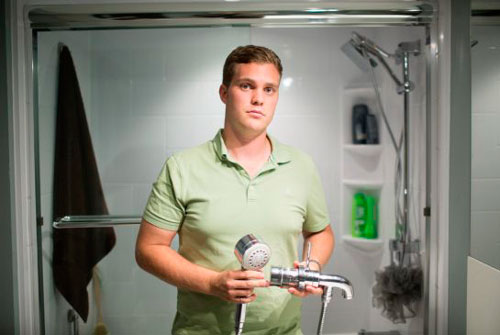The lawyer who is taking on Toronto’s condo developers
The Toronto Star
By: Susan Pigg Business Reporter,
26 September 2014

KEITH BEATY Toronto Star
From his cramped corner offices at Bloor St. and Avenue Rd., lawyer Ted
Charney has a real-time view of Toronto’s exploding condo market.
He can see the cranes dotting the downtown, he can watch the concrete
skeletons climb into the sky — and he can feel condo owners’ pain.
Charney, 54, knows first hand what it’s like to buy a condo from a set
of blueprints and then, when you finally open the front door for the
first time years later, find you didn’t get what you paid for.
In his case, what was supposed to be 11 feet of floor-to-ceiling glass,
overlooking the balcony and an expansive view south from King St. W.,
was cut in half by a concrete fire wall.
Charney had no warning the glass would be gone, and with it much of the
light into the two-bedroom unit. He decided to sell the unit.
“If I ever buy a condo again, I won’t buy preconstruction.”
This week Charney launched his sixth class-action suit against a major
Toronto condo developer. In this latest case he’s seeking $29 million
over what amounts to plumbing problems — water valves that allow for
extreme temperature fluctuations in Great Gulf’s X Condominiums project
on Charles St.
Earlier this year he launched a $30 million suit against North York
developer Elad Canada Inc., alleging that it failed to deliver the
“easy underground access” to the Don Mills subway station and nearby
Fairview Mall, promised in its glossy marketing materials.
Four of his condo class-action suits have already been certified by the
court — essentially given the green light to go ahead — seeking
compensation for owners in downtown highrise projects inconvenienced by
falling glass and faulty balconies.
Charney believes there will likely be more lawsuits to come as the
condo becomes the only option for many buyers in a city where house
prices have virtually doubled in a decade.
Some 53,614 condos were under construction across the GTA as of the end
of June. Another 31,372 were in the sales stage, according to condo
research firm Urbanation.
And a staggering 277,108 more are proposed.
“Generally, the condo industry is pretty good. Most of the developers
who are building the majority of the buildings are very experienced and
reputable,” says Charney.
“But there is always going to be the odd one that isn’t okay.”
Charney is far from a newcomer to class actions, where lawyers take on
the costs, and the risks, of helping a bunch of Davids — people who
have suffered the same wrongs, but otherwise couldn’t afford a lawsuit
— take on Goliath, major corporations with the money and time to fight
back.
In exchange, the lawyers typically get about 25 to 30 per cent of any
settlement.
Charney recently won $23 million on behalf of people impacted by the
Sunrise Propane explosion in Downsview back in 2008. He’s also handled
some of the largest food contamination lawsuits in Canadian history:
The $27 million settlement reached with Maple Leaf Foods over
listeria-tainted meat and the Menu Foods case in which thousands of
North American pets became ill or died from contaminated pet food.
The condo suits have sent shock waves through an industry where sales
agreements have typically been heavily weighted in favour of developers
and so full of disclaimers, buyers like Charney find themselves with
few options but to sell if the unit doesn’t turn out as expected.
“One of the goals of class actions is behaviour modification. I hope
this will have that effect on the industry.”
Developers have traditionally insulated themselves from legal liability
by using their reputation and their brand to drum up sales. Then they
create a separate corporation to manage and build the project.
That means once the building and land are handed over to the new owners
and their condo board, that company becomes a mere shell, with no
assets of its own should someone sue.
Charney has already won a critical victory in the falling glass and
faulty balcony cases that could change all that: The court has agreed
that the development companies are just as much a part of the lawsuit
as the affiliated building companies they created.
So far, most of Charney’s class actions have focused on material
defects and compensation for owners banned from using balconies that
are their only backyards.
But now emerging is a new class of cases which he describes as breaches
of contract or misrepresentations. Basically at issue is what the
glossy preconstruction sales brochures promise and what ends up being
built.
It’s those cases that could have the biggest impact, especially given
the tens of thousands of units under construction.
The cases are being closely watched by developers who say they are just
as upset as everyone else when glass turns out to be defective or
changes required to accommodate heating and air conditioning systems or
city building officials’ concerns, leads to unexpected, last-minute
design changes.
“Builders strive to deliver a final product that fulfils the desires
and expectations of new-home buyers,” says Bryan Tuckey, president and
CEO of the Building Industry and Land Development Association.
“Engineers do their best to ensure final design drawings are in keeping
with the original sales material. However, in some unique
circumstances, practical construction requirements often lead to minor
changes to suite and amenity designs.”
—†—
Condo developer hit with $29 million
class-action suit
Toronto Star
By: Susan Pigg Business Reporter
22 September 2014

NICK KOZAK
Condo owner Etienne de Muelenare got so tired of waiting for the
developer of his Charles St. building, Great Gulf, to fix problems with
pressure valves, he spent $4,000 to have the work done himself and has
now launched a $29 million class-action suit against Great Gulf.
First there were the multi-million lawsuits over falling glass and
faulty balconies, then came the class-action suit against a North York
condo developer for allegedly failing to deliver a promised subway
connection.
Now a frustrated Toronto condo owner has launched a $29 million
class-action suit over a relatively small, but potentially dangerous,
issue — wildly fluctuating water temperatures in a Charles St. highrise
project that are being blamed on the installation of improper water
valves.
In a lawsuit filed late last week , Etienne de Muelenaere alleges that
Great Gulf, the developer of his 44-storey X Condominium building, is
“negligent” and in breach of contract because the wrong water valves
were installed in some 417 units.
After Great Gulf failed to act quickly to fix the problem — the lawsuit
says some residents have been scalded — he spent $4,000 to have tiles
in his two bathrooms cracked and the valves replaced.
Great Gulf not only refused to compensate him, says de Muelenaere, but
he couldn’t find replacement tiles four years after the building was
finished and was forced to use more affordable plastic liners which, he
believes, have devalued his unit.
“It's been really frustrating”
“It’s been really frustrating. You try to be patient. But I’m tired of
getting emails back from Great Gulf saying we’re working on a solution
and there’s never a time line,” said de Muelenaere, 26.
A class-action suit may seem like a drastic move over a little plumbing
problem, but it’s unlikely to be the last as Toronto’s condo boom
continues to play out across the skyline.
The law firm driving this latest legal salvo against condo developers,
Charney Lawyers and Sutts, Strosberg LLP, has also heard from condo
owners who have just moved into brand new condos, bought from
blueprints two or three years ago, to find promised nine-foot ceilings
are only eight.
“The more new buildings that go up, the more we’re finding there are
some issues common to the whole building,” says lawyer Ted Charney, who
is handling de Muelenaere’s suit.
“Part of what we’re trying to do is hold developers accountable.”
Not long after he moved into his 5th floor condo in January, 2012 and
took a shower, de Muelenaere realized there was a problem which he
suspects has been an issue since the building was completed in late
2010. Every time someone in a nearby unit flushed a toilet or started
up their dish or clothes washer, the water in his shower suddenly got
hot or cold.
There were numerous complaints which the condo board, Great Gulf and
even officials of Ontario’s new home warranty program, Tarion ,
investigated. So did de Muelenaere.
“I work in construction, so I did a bit of research,” he says,
suspecting that non pressure-balanced valves were used instead of
pressure-balanced valves which keep temperatures constant, despite
fluctuations in the hot or cold water supply lines.
Great Gulf became aware of the valve problem in 2012 but says it took
until 2013 to discover the reason. No one has been scalded, it stresses.
Great Gulf has “been working on a solution for several months,” and has
tested a prototype device in a few units which would stop the
temperature fluctuations without having to crack out the tiles in all
417 units, many of which have two bathrooms, says Great Gulf
spokesperson Madeline Zito.
“We advised the condo board and the residents who complained that we
were working on a solution. But we have to be careful to come up with a
solution that works and where we’re not being intrusive to a homeowner
and creating problems for them,” Zito added.
Implementing the
fix
Great Gulf is about to start implementing the fix, which is expected to
cost less than $1 million, she said.
Charney said he became aware of the X Condominium water problem through
an anonymous phone call, pointing him to a number of frustrated
residents, including de Muelenaere.
So far Charney has launched a number of condo class-action suits
against developers and sub-contractors, four of which have been
certified to move ahead by Ontario’s Superior Court.
Three related to glass panes which fell from buildings and a fourth
relates to faulty balcony railings that left the outdoor space off
limits to many residents for months.
Since then, Charney has also initiated a $30 million class-action suit
against Elad Canada Inc., claiming that it failed to deliver on
marketing promises of “easy underground access” to the Sheppard subway
line and nearby Fairview Mall from its Emerald City Condominiums
project at Don Mills Rd. and Sheppard Ave. E.
Instead, residents were surprised to find on move in that there was no
tunnel.
top contents
appendix
previous next

